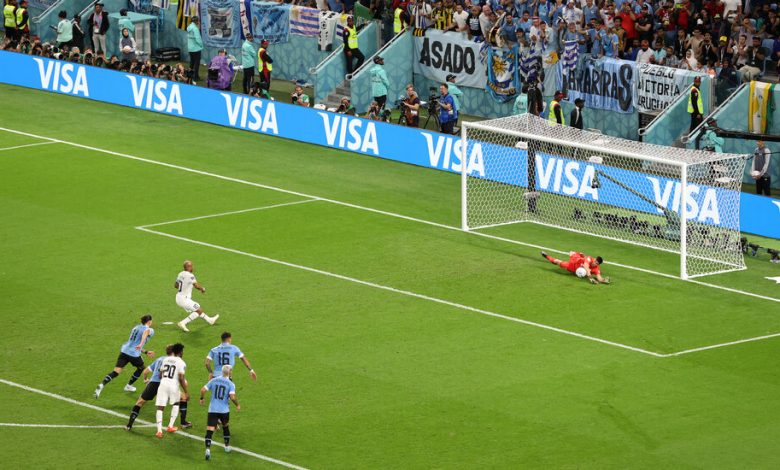Uruguay engineers another Ghana exit, but falls victim itself.

AL WAKRAH, Qatar — With each stuttering step, the goal staring back at Andre Ayew seemed to get a little smaller. Ayew, Ghana’s most experienced player, had taken it upon himself to take a crucial penalty against Uruguay, to exorcise the demons of 12 years ago, the last time Ghana had a crucial penalty to advance in the World Cup against Uruguay.
But history repeated itself. Ayew missed.
Ayew’s tame penalty was easily saved by goalkeeper Sergio Rochet, and Uruguay soon scored twice, and though it was still early, Ayew’s miss effectively sealed the end of Ghana’s journey. Instead of becoming the third African team to reach the knockout round, an achievement that would have been a first in the tournament’s near 100-year history, Ghana is out.
The bad news for Uruguay? It is out, too. On a path to finishing second in the group with only minutes remaining against Ghana, Uruguay got the worst goal possible: Korea had scored a late goal to beat Portugal in a game played simultaneously about 14 miles away.
That score pushed the Koreans into a tie with the Uruguayans in the standings, and tied with them on goal difference. Uruguay’s last hope was to use about seven minutes of injury time to find the third goal that would push it through. It never came.
Instead, it joined Ghana in leaving the tournament in torment, the latest victims in yet another wild denouement for a tournament that is becoming accustomed to dramatic plot twists.
Ghana could have gone through with just a tie, having started the day in second place, but in Uruguay it came up against an opponent that continues to haunt the dreams of millions of soccer fans in the West African country. And once again, 12 years after his handball had helped Uruguay eliminate Ghana from a World Cup, it was Luis Suárez who proved to be Ghana’s tormentor.
A Brief Guide to the 2022 World Cup
What is the World Cup? The quadrennial event pits the best national soccer teams against each other for the title of world champion. Here’s a primer to the 2022 men’s tournament:
Where is it being held? This year’s host is Qatar, which in 2010 beat the United States and Japan to win the right to hold the tournament. Whether that was an honest competition remains in dispute.
When is it? The tournament opened on Nov. 20, when Qatar played Ecuador. Over the two weeks that follow, four games will be played on most days. The tournament ends with the final on Dec. 18.
Is a winter World Cup normal? No. The World Cup usually takes place in July. But in 2015, FIFA concluded that the summer temperatures in Qatar might have unpleasant consequences and agreed to move the tournament to the relatively bearable months of November and December.
How many teams are competing? Thirty-two. Qatar qualified automatically as the host, and after years of matches, the other 31 teams earned the right to come and play. Meet the teams here.
How does the tournament work? The 32 teams are divided into eight groups of four. In the opening stage, each team plays all the other teams in its group once. The top two finishers in each group advance to the round of 16. After that, the World Cup is a straight knockout tournament.
How can I watch the World Cup in the U.S.? The tournament will be broadcast on Fox and FS1 in English, and on Telemundo in Spanish. You can livestream it on Peacock, or on streaming services that carry Fox and FS1. Here’s how to watch every match.
When will the games take place? Qatar is three hours ahead of London, eight hours ahead of New York and 11 hours ahead of Los Angeles. That means there will be predawn kickoffs on the East Coast of the United States for some games, and midafternoon starts for 10 p.m. games in Qatar.
Got more questions? We’ve got more answers here.
Suárez, told by a Ghanaian journalist on the eve of the game that many of his countrymen consider him to be “the devil himself” for a handball that denied Ghana what would have been a place in the semifinals of the 2010 World Cup, played like a man possessed.
Just five minutes after Ayew’s penalty miss, he burst into the penalty area, worked an angle and delivered a shot that Lawrence Ati Zigi spilled into the path of Giorgian de Arrascaeta. Arriving like a flash, de Arrascaeta bundled the rebound over the line.
He and Suárez combined again a few moments later, with the latter producing a moment of magic: lobbing the ball over an onrushing defender with his first touch for a pass that de Arrascaeta coolly volleyed into the net.
The penalty miss, and the flurry of goals, knocked Ghana off its stride, and made for a strange atmosphere to envelope the Al Janoub stadium. The close of the first half was played against a backdrop that could best be described as a low mumble, with the occasional outbreak of trumpets from a group of Ghanaian musicians gamely trying to urge their team back to life. They did not have much luck.
The players did try to rouse themselves by locking arms and forming a huddle before disappearing to the locker room for halftime. Coach Otto Addo came out with alterations, dispensing with the services of Ayew and his brother Jordan, the only two players on the Ghana squad with previous World Cup experience.
But those changes did little to shift the momentum. Uruguay continued to look the more dangerous, and Ghana’s defense, one of the tournament’s most porous, remained on its heels.
Ghana was offered some respite from the menace of Suárez when he was substituted with 25 minutes remaining. But by then he had already done his damage: He had once more left his mark on Ghana, had once again been the architect of Ghana’s departure from the World Cup.
Uruguay was coasting into the knockouts, and then it was not. News filtered through that South Korea had taken the lead.
At Al Janoub, the air suddenly become charged with the type of energy that had been absent since about the time Uruguay had doubled its lead in the 32nd minute. Play suddenly became a bit more frantic. Players exchanged desperate looks. The crowd came too life, too.
“We saw on the screen” that Korea had taken the lead, Ghana defender Daniel Amartey said. “I just told my team that we need a goal now, but they need a goal now. We have to defend for ourselves. If we don’t go, they don’t go.”
On the bench, Suarez pulled his shirt over his face, and his eyes filled with tears. Helpless, he watched his teammates charge up the field in what would become a forlorn search for the one goal they needed to sneak past Korea on goal difference. There were near misses, failed chances, penalty appeals that went unanswered.
Most everything that a soccer game could deliver was produced in those closing stages, but for the one thing Uruguay craved the most: a goal.
When the whistle blew for full time, a group of Uruguayan reserves stormed toward the field and surrounded the German referee, Daniel Siebert, jabbing their fingers at him, bellowing in his general direction. But none of it mattered.
Ghana might have been gone. But so was Uruguay.



